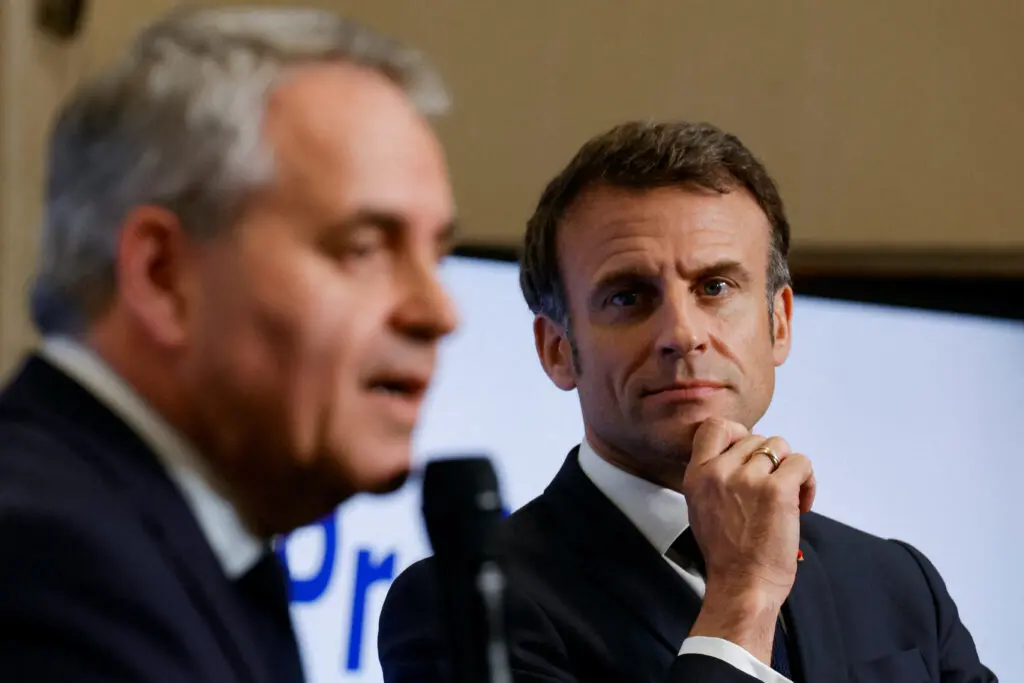
French President Emmanuel Macron (R) looks on as President of the Regional Council of Hauts-de-France Xavier Bertrand speaks
PASCAL ROSSIGNOL / POOL / AFP
Emmanuel Macron promised that he would choose his prime minister once the Olympic Games were over. The closing ceremony of the Games was held on Sunday, August 11th, and the countdown is now on for an appointment that has been almost a month in the making.
While the left-wing coalition has finally found a candidate who meets all the criteria required by progressive ideology, it would appear that the President is leaning more towards a centre-right Prime Minister, probably from the Les Républicains (LR) party—a choice that is likely to leave voters with a strong sense of frustration, as they will once again feel that they have voted for nothing.
Following the legislative elections on July 7th, which resulted in the formation of a National Assembly devoid of any majority, Prime Minister Gabriel Attal tendered his resignation to Emmanuel Macron on Tuesday, July 16th. Since then, France, which has just lived to the rhythm of the Olympic Games, has been without a government.
Since the second round of the elections, the left-wing coalition known as the Nouveau Front Populaire (NFP), which came out on top by just a few seats, has been convinced it has legitimacy to form the new government. For several weeks, the various parties that make up the coalition gave the French people a pitiful spectacle of rivalry and personal hatred while they tried to find the person they felt would be most likely to become Prime Minister. In the end, they settled on a certain Lucie Castets, a complete unknown to the French public.
The Left’s hysteria about putting ‘their’ prime minister forward at all costs overlooks a number of realities. Firstly, the constitution of the Fifth Republic does not have a parliamentary system in the strict sense of the term, which means that the President is under no obligation to appoint as Prime Minister a person from the ranks of the party that came out on top in the elections. Secondly, the alleged ‘victory’ of the left in the elections is nothing but a sham: the coalition came slightly ahead in terms of total number of seats, but the Rassemblement National remained the biggest single party in terms of the number of elected representatives, and the leftist vote is far from the majority.
The candidate chosen by the Left after a heated dispute looks like the worst that could be dreamt of. She has to her ‘credit’ the fact that she is Director of Finance for the City of Paris, which can boast of having exploded its debt to over 7 billion euros in just a few years. She just came out, revealing that she is in a relationship with a woman and the mother of a baby girl—as if, in France, it were now almost necessary to belong to the LGBT lobby to gain access to the highest public offices. She intends to “extend the rights of LGBTQI people” if she comes to power. She wants to implement the NFP’s economic programme in its entirety, which would have the effect of exploding the state deficit even further.
As soon as the Olympic Games were over, the putative Prime Minister sent her group’s parliamentarians an outline of her government programme, in order to send a signal of her determination to the President of the Republic, even though Emmanuel Macron has made it clear that he does not intend to appoint her.
So who will become Prime Minister? The pressure is mounting on the President, who is accused by all sides of blocking the institutions. Since the end of July, Macron has retreated to the Fort de Brégançon in the Var, the traditional summer retreat of French presidents. He has held a number of consultations there, but no name has yet emerged.
The name of Xavier Bertrand is nevertheless circulating insistently in the ranks of the majority. He is the President of the Hauts-de-France region in the north of the country, a minister under Nicolas Sarkozy and a member of the Les Républicains party, which he left for a time because he felt it was too far to the right, before returning to take part in the presidential election primary in 2021. Xavier Bertrand is the perfect embodiment of a right-wing conservatism that is purely fictional, veering relentlessly towards centrism—a drift in the Les Républicains party that has led this once essential party to gradually disappear from the French political scene.
If Emmanuel Macron confirms this choice, the dissolution of the National Assembly and the elections will have had the effect of bringing to power a centrist conglomerate that represents precisely everything that the French are rejecting in the ballot box, on the Right with the Rassemblement National, and on the Left with the Nouveau Front Populaire. It is hardly surprising, then, that voters are experiencing a crisis of confidence in the democratic machine, which is growing dangerously deep. Never have elections seemed so pointless, never has the seizure of power by a small oligarchy self-confident of its worth been so obvious.
According to the Journal du Dimanche, Macron is expected to name the prime minister after August 15th, and the government by the end of the month.
